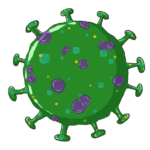With so much discussion and concern in the community currently about Covid-19, children around you may have questions. The following write up gives easy to understand information about Covid-19 that you might find helpful when talking with children.

The world is currently in the midst of a pandemic. A pandemic means that lots of people around the world have the same illness at the same time. The illness is called Covid-19 or coronavirus. It can make people very sick, and some people have died. Covid-19 is a type of virus. It belongs to a group of viruses called coronaviruses because they look like crowns under a microscope. Corona means crown in Italian.
Covid-19 is particularly dangerous to people because it is new. In a healthy person’s body, every time they are exposed to a new germ, their own body makes antibodies to fight the germ. The body remembers and if that germ gets into the body again, antibodies go to work to protect us. But since Covid-19 is new, no one has had the chance to develop any antibodies yet.
Covid-19 targets people’s lungs and causes breathing difficulty. There are some groups of people who are particularly at risk: older people, people who are sick with other illnesses that make it hard for their bodies to fight germs, and people who already have breathing troubles like asthma.
Children can get Covid-19, but it doesn’t seem to affect them as much as people who are older. Children don’t get really sick when they get Covid-19, and worldwide, so far, no children have died from Covid-19.
Covid-19 is difficult to identify. It can look a bit like the flu or like a simple cold or cough. In many healthy people, children and adults, the symptoms of Covid-19 are very mild. When people walk around with Covid-19, they can unknowingly spread the virus to people who are at greater risk.
Covid-19 spreads via droplets through coughing or sneezing. When a person with Covid-19 wipes their nose or mouth with their hand, the virus goes onto their hand—and from there, to other people and objects that they touch. But Covid-19 does not survive in the air and it is not as easily transmissible as other illnesses.
The best thing you can do to prevent Covid-19 from going from you to another person by WASHING YOUR HANDS With SOAP AND WATER. You should work on washing your hands for at least 20 seconds. You can sing the ABCs to help you know how long to wash. You also should try not to touch your face.
Different countries are taking steps to 1) keep the virus contained to areas where it already is and 2) slow down its movement between people. The government in Washington D.C. and in our state are working on both of these and have made plans to help keep us all safe and healthy.
You might hear people talking about social distancing. This means staying away from other people and staying at home more than usual. This helps slow down the spread of Covid-19 to give hospitals and health care workers the opportunity to take care of the people who are sick. We cannot all be sick at the same time. We don’t want to overwhelm hospitals and health care workers. So, if we slow down the transmission of Covid-19, it is better for everyone. This means that some events, classes, or fun activities you usually do might be cancelled. This is disappointing but it will help make sure fewer people get sick at the same time. This way we can take care of everyone.
If you have questions about Covid-19 or you are feeling worried, there are adults in your life, like your parents or the people who take care of you at home, teachers, and doctors, who you can talk to about it. These adults can find accurate information and advice that will help them make decisions that are right for your family. Everyone is working very to keep you safe.
Find out more through the resources below:
- But why: A Podcast for Curious Kids – ‘Coronavirus for Kids and the Science of Soap’
Excellent podcast created by VPR’s Jane Lindholm that explains complicated issues in a scientific and respectful way.
- What Kids Want to Know About Coronavirus
A comic created by NPR in conjunction with with Tara Powell at the University of Illinois School of Social Work, Joy Osofsky at the LSU Health Sciences Center in New Orleans and Krystal Lewis at the National Institute of Mental Health.
- The Covibook
A preschool aged child friendly guide to Covid-19 by Mindheart Kids – a Spanish parenting resource.
- Flipboard: Coronavirus
A science based guide for older children about the virus.

